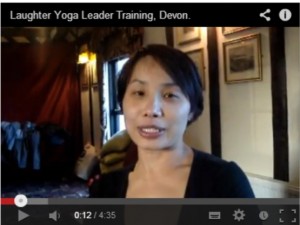I’ve just been watching an amazing video on TED (the usual source of all things inspiring!). This particular video, by Jane McGonigal, is called “The game that can give you 10 extra years of life”. In fact I loved it so much that I really don’t mind if you pootle over to it right now and watch it. Because what really matters is not where you get the information from – but that you “get” the information!
Now you may start off watching this video, and glance at the bottom of the screen where you can see the running time is 19 minutes! Ouch, that’s a chunk out of a working day! Suddenly you get thoughts
like “I can’t waste my time sitting around watching some woman talk about video games – I have so much work to do”. Well let me urge you to indulge yourself and watch on!
I promise something magical happens. Yes, you’ll get what she promises (spoiler alert!) but in addition, this little video is the sweetest, most subtle reminder of priorities that I’ve seen for some time. And let’s face it, we need reminding!

You see, whilst the government is experimenting on the economy, and making cuts to services and wages, and the media is bustling and bristling with indignation, fury and exposes, we’re constantly being fed a menu of “fear and urgency”. Of course it’s in the government and bankers’ favour to have us all running around trying to make as much money as possible… they get the tax from every £1 we earn, and the longer we earn it for (think delaying pensionable age). But is it in our own interest?
The stress and overload of work, or the stress of no-work simply cannot be a good thing. As McGonigal rightly points out, the lessons we learn from others on their deathbeds, quite literally, have never been “I should have worked more hours”…
Of course, there are complex reasons why we are all working so hard and so much. After all we didn’t get to be the 3rd out of 28, in the “longest hours worked in Europe league table” overnight. It’s evidently been in our systems for some time and it’s not likely to disappear quickly. But there are things we can do to help.
Feedback to your boss if you feel you have too much stress. If they don’t know about it, then they can’t help you. Remember if you accept additional work that is putting you under stress and strain, then you are colluding with the establishment and perpetrating the culture of “must work longer and harder”.
Enjoy your work. OK, for some of us that may sound like tough one, and I don’t mean to be flippant. So assuming that you cannot change or leave your job for whatever reason, at least there are measures that might help you even if you absolutely hate your work. Firstly dwell on the good bits. Moaning about the bad stuff just makes them seem even worse, whereas thinking about the positive bits (the pay, your nice colleague, the view from the window, the fact that you have a window!) can make work seem a lot more pleasant. Remember wherever your focus goes – grows!
Put on a cheerful face. There’s numerous studies that show that if you’re smiling and looking happy, you can trick yourself into believing you really are happy. Even a fake smile will do the job. Just grin and bear it!
Take every opportunity to laugh. Laughter is the ultimate in stress release and stress relief. Good hearty laughter for 15-20 minutes a day will help you release endorphins, reduce cortisol, improve your mood, enhance your self-esteem, improve your connectivity to others.
…. and it’s proven time and again, that people who are more smiley, positive and happy-looking are more likely to get the better jobs, as people would prefer to work with them.
And finally, take McGonigal’s advice, do all the things she suggests in her video – because you can, and because they are fun… But a word of warning before you start, please ask yourself what are you going to do with an extra ten years of life? I wonder how many people will think “when I retire, I’ll have an extra 10 years to enjoy life, spend time with friends and family, and play more”
And I’d like to ask – why wait? On exactly what date does that extra 10 years start? I’d suggest it should start TODAY!
Here’s the link to that video: http://www.ted.com/talks/jane_mcgonigal

 Sue said: “Tim Vine is one of my favourite comedians so I was delighted when he came to our area to record a show for Radio 4. I had a bit of a cold, but thought I would still put my name down as a potential guest… and then as my cold took effect throughout the evening, I was beginning to regret that decision. Fortunately adrenalin really kicked in when I actually got invited on stage to talk about Laughter Yoga, and when I realised the PR opportunity I decided to offer Tim and the audience a quick Laughter Yoga session.
Sue said: “Tim Vine is one of my favourite comedians so I was delighted when he came to our area to record a show for Radio 4. I had a bit of a cold, but thought I would still put my name down as a potential guest… and then as my cold took effect throughout the evening, I was beginning to regret that decision. Fortunately adrenalin really kicked in when I actually got invited on stage to talk about Laughter Yoga, and when I realised the PR opportunity I decided to offer Tim and the audience a quick Laughter Yoga session.












